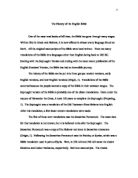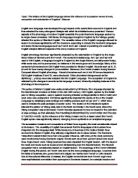These sounds made words like:
-
-at making words like that
-
o--er making words like other
-
nor--- making sounds like North
All of the missing letters above represent the sound that was made and in modern English stand for the sound th.
The first law book was issued by King Athelbert and was written in Anglo Saxon in the year 602AD. Next to come to our wonderful country were the Vikings who migrated over the next two hundred years bringing their language which was called Old Norse but this was only just about understood by the Anglo Saxons at that time. This caused problems. they couldn’t really understand each other as some were speaking old English and some were speaking Old Norse, even though they were from the same origins. They then altered their language by dropping the inflections, the bits at the beginning and the ends of words like ing, ed, at the ends and pre, ge, at the beginning's in modern English today. In Between 700AD and the prefix, bits at the beginning of a word, ge died away.
English gained a huge range of words form Old Norse as it borrowed words such as leg, skull, freckle, rotten, churn, rubbish, ladder, husband, sky, window and many more. England gained many place names from Old Norse too over 1400 in fact!
English also gained a large part of its Grammatical systems from Old Norse like the use of prepositions, words like up, down, in, out, off, from, take, to and the pronouns, words describe relation, they them and their. Before this change the pronoun he could mean either he or they depending on how they were used in a sentence.
Then in 1066AD William the Conqueror led the Normans from France and these although they were descendants of the Vikings did not continue their native language Norse and started speaking French. When he conquered England he took root and made a French aristocracy, that’s government and important people. It was the Norman invasion that made the change from old English to Middle English.
In 1150AD Middle English started to emerge. It soon became the language of politics and court. The main impact was Middle English Spelling. The sound systems which is called Phonology, of the words and spellings had changed dramatically but the actual spelling of the words themselves had not changed since the Anglo-Saxon times. The French then updated the sounds and introduced a letter c to describe the sounds king, cow, and chime, just as they were in old English, but this gave us the letter c that we still use in the modern alphabet today.
Byson in 1990 found that the English language gained around 10,000 new words in this era of which three quarters are still used today. Mostly French was spoken by the upper class and so the vocabulary referred to high society.
Anglo- Norman Origins
Mason
Tailor
Fashion
Mutton
Beef
Bacon/ Pork
Lingerie
Encounter
Employee
Words of Anglo Saxon Origin
Builder
Clothes
Sheep, Cow, Pig
Drunk
Worker
English and French met in this time period as inflections were added French words such as:
Raisonable (old French) + un (old English Prefix) = unraisonable which in modern English developed to unreasonable.
In 1385AD school children started learning English instead of French and following this in 1399AD for the first time since 1066AD the King spoke English as a mother tongue. This king was Henry IV.
A famous writer called Chaucer died in 1400AD. He wrote French flavoured Middle English.
In 1450AD there was the ‘great vowel shift’. This was were the pronunciation of words were changed as some vowels were pronounced in longer forms than other this moving away from the written version.
The grammar of Middle English began to change. The Anglo Normans had made word endings which were plural, sometimes end in es. This development was generally stressed on the first syllable eg Table, Cabbage so the unstressed word endings gradually got less and less important. Because of this word endings in Old English lost their emphasis and definition then eventually faded out of use all together
By the end of the 15th century English was the first language of the English. In 1947AD William Caxton set up England’s first printing press.
Between 1530 and 1660 England underwent the biggest change in lexical history or so it was quoted by Crystal 1999.
First the new words came mainly from the continent:
From Latin and Greek
Adapt
Appropriate
Catastrophe
Exist
Exaggeration
Immaturity
Monopoly
Vacuum
Temperature
Spain and Portugal
Alligator
Apricot
Tobacco
Hammock
Potato
Italy
Balcony
Concerto
Design
Giraffe
Rocket
Solo
Volcano
Violin
Opera
France
Alloy
Anatomy
Chocolate
Passport
Vase
Tomato
Ticket
Explore
Invite
`
Many other words were borrowed from other places around the world many of these were to do with food eg as above vegetable
In 1601 the first dictionary was produced by Richard Cawdrey, called a Table Alphabeticall.
In 1755 Dr Johnsons Dictionary was published and this made spelling largely standardised.
In 1779 Robert Lowth and Lindley Murray published their grammar books telling people how to speak correctly.
In 1828 Noah Webster brought out his own dictionary. This dictionary was very different because it was the American dictionary of English. this special dictionary was published for the one reason to make English and American English different. To do this he changed the spellings of words. For example, color, labor, theatre.
1879 saw the start of one of the most popular dictionaries today the New English Dictionary, now called the OED or Oxford English Dictionary written by James A H Murray. This showed how to correctly spell words and had historical notes to go along with the entry. English then developed as spellings were no longer phonetically spelt.
A huge technological change prompted another gathering of lexis in the1900’s. For example flight was a huge impact on new lexis. Words arrived with technology.







